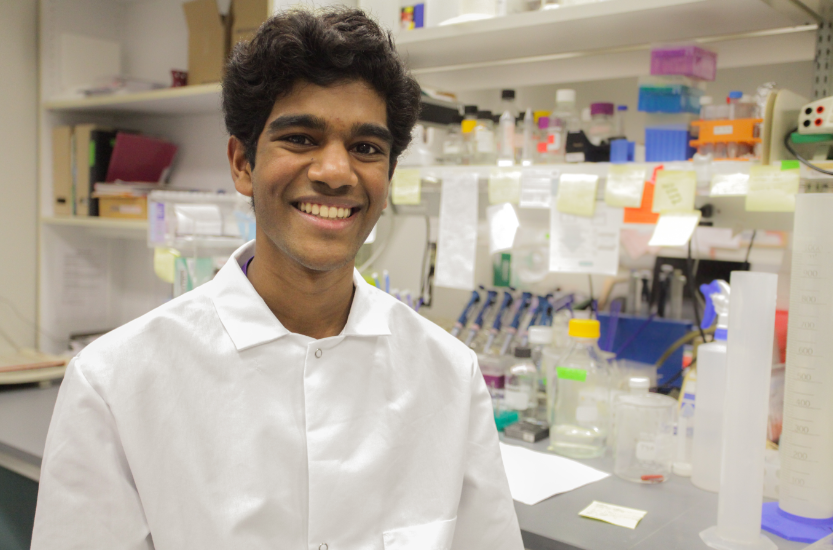A student of BRF and LSU Health Science Center Shreveport’s Science and Medicine Academic Research Training (SMART) Program was the sole student in the state of Louisiana to advance to the semifinalist round in the prestigious Siemens Competition in Math, Science & Technology.
Sunjay Letchuman, a senior at Caddo Parish Magnet High School, was among the top 491 competitors in the nation presenting 300 science research projects.
Letchuman’s project, titled “Differential Redox Profiles of Veins and Arteries Associated with Coronary Artery Bypass Graft Failure,” focuses on the investigation of the failure of coronary artery bypass grafts of the saphenous vein located in the leg. Though Letchuman’s project did not advance to the finalist round, the research’s implications may have an impact on the medical and research fields.
Letchuman explains that in coronary artery bypass grafting, a common open-heart surgery, the grafted vein’s patency rate, or openness, diminishes after 10 years, leading to complications and even death.
Letchuman and fellow researchers in SMART mentor Dr. Chris Pattillo’s LSU Health Science Center lab, part of the Department of Molecular and Cellular Physiology and the Center for Cardiovascular Diseases and Sciences, have theorized that a particular practice in the grafting procedure may correlate with later complications.
A period of time in which the vein is removed from the leg and then grafted into the new environment leaves the harvested vein in some degree of hypoxia, or in a lack of oxygen, for 100 or more minutes.
“There are some arguments against this, but for about 100 minutes, the vein doesn’t get much oxygen, though they do infuse it with a saline solution and blood thinner, but cells are stressed by the low oxygen level,” Letchuman said. “This is not the only reason that a graft can fail, but our lab has shown that this is associated with failures.”
Also involved in the project and research are postdoctoral fellow Bandana Shrestha, Ph.D.; Dr. Pattillo, also an assistant professor; and graduate assistant Priya Prasai.
Letchuman said he was guided in the project by his fellow researchers’ work and leadership.
To further advance the research and project, Letchuman reached out to LSU Health Shreveport Dr. Vyas Rao, a cardiothoracic surgeon.
“He was interested in collaborating,” Letchuman said. “I was happy to tell my lab. We were able to view some of his surgeries.”
Letchuman has been in Pattillo’s lab since June of this year, and he will continue to work there until the 2017-2018 year of the SMART Program ends in May.
The SMART Program provides a yearlong research experience with investigators at LSU Health Science Center Shreveport for 10-12 academically advanced high school seniors who have a career interest in medicine, biomedical research, or biomedical engineering.
Students receive mentorship from Ph.D. researchers, working in the researchers’ laboratories 40 hours per week for seven weeks in the summer and at least 10 hours per week during the school year.
Completing the course earns students two high school elective credits and the experience of hours of training in top notch, local research facilities.
SMART graduates have been accepted to prestigious colleges offering substantial scholarships. Many students choose to work in research labs or medical fields in their professions. Letchuman is part of the 21st class.
“The SMART Program has been incredible,” Letchuman said. “It has taught me so much about being in a lab, and also about work ethic. I have learned how to stay humble in research and science. You think you know a lot about a subject, but once you get in the lab, you realize how much you don’t know. The most successful scientists admit that we know so little.”
The Siemens Foundation established the Siemens Competition in Math, Science & Technology in 1999. The competition is the nation’s premier science research competition for high school students and seeks to promote excellence by encouraging students to undertake individual or team research projects. It fosters intensive research that improves students’ understanding of the value of scientific study and informs their consideration of future careers in these disciplines.


